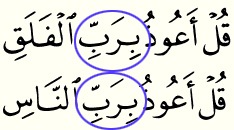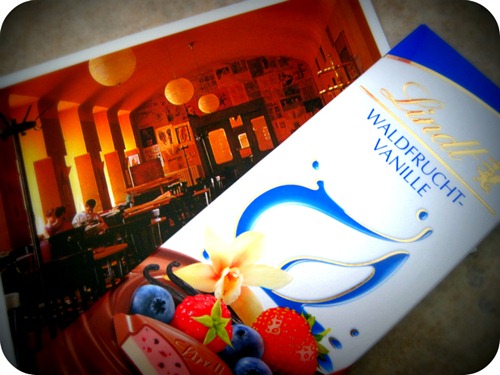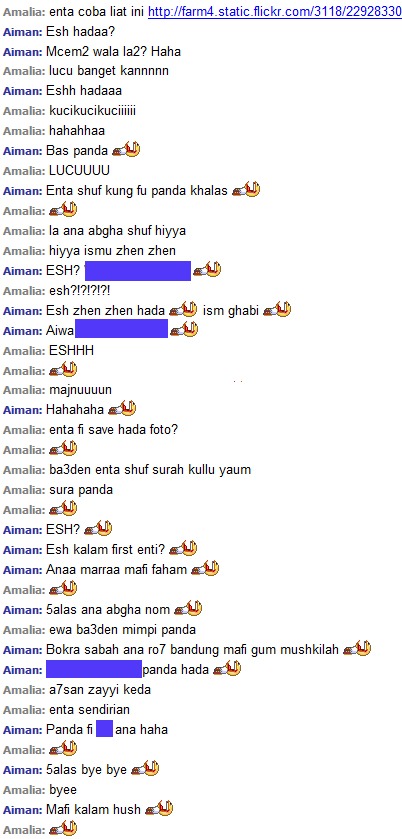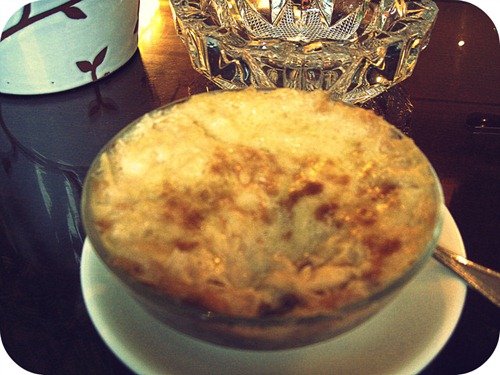As I’m an extremely forgetful person, I have a habit of writing down the things I learn about Islam. I type them into a word document, because otherwise I’d forget. It’s just too easy for me to forget. Every now and then, I’d read what I have typed over and over again so that I’ll keep on remembering them. So, instead of making them a benefit only to myself, I thought I’d post some of them here too, so that some of you can get a benefit from them :). But if you have the time to listen to these recordings (or if you’re more of a listener than a reader), I’d recommend to listen to them. Brother Nouman Ali Khan explains things in a way that is easy to understand and follow (without making me falling a sleep haha) — and that’s why I listen or watch to most of his speeches.
Tafseer of Surah Al Ikhlas:Â Part 1Â |Â Part 2Â |Â Part 3Â |Â Part 4Â |Â Part 5
Say, “He is Allah , [who is] One, Allah, the Eternal Refuge. He neither begets nor is born, nor is there to Him any equivalent.”
— Surah Al-Ikhlas (1-4)
The Connection between Surah Al-Ikhlas & Other Surahs
Surah Al-Ikhlas and Surah Al-Masad
In Surah Al-Masad (one surah before Al-Ikhlas; also called Al-Lahab), all verses/ayat end with an Arabic character of ba (ب), except the last verse which ends with the letter daal (د). In Surah Al-Ikhlas, every verses end with the letter daal (د). So the rhyme pattern from the previous surah continues in this surah. From the stylistic point of view, there is a cohesion and continuity between the two surah.
Shifting the Focus of Attention
Abu Lahab (which is mentioned in Surah Al-Masad)Â was a known relative of and a neighbor of the Prophet SAW, so he was a great concerned to the Prophet SAW. He continuously became the focus of the Prophet SAW.
In Surah Al-Kafirun (a Surah before Al-Masad), it was the Prophet SAW who was told to talk to the disbelievers. However, this was not case with Abu Lahab. Allah SWT told the Prophet SAW in Surah Al-Masad that He would deal with Abu Lahab alone and gradually destroyed him because of his continuing denial against the message brought by the Prophet SAW. Why was it the case? The answer can be found in the next surah, Surah Al-Ikhlas. Allah SWT wanted the Prophet SAW to remain focus on the Oneness of Allah SWT and teaching this concept to others (which is expressed in Surah Al-Ikhlas).
The Introduction and the Conclusion
In the first ayat of Surah Al-Fatihah alhamdulillahi rabbil ‘alamin (which is at the beginning of the Qur’an), Allah SWT introduces Himself as Allah (from alhamduli allahi) and Lord of the worlds (rabbil ‘alamin). At the end of the Qur’an, we can find these two things that are described in the first Surah. Surah Al-Ikhlas is the answer to the question of who Allah is:
… while Surah Al-Falaq and Al-Nas are the answers to the question of who the Lord/Rabb is:

So what initiates in the Fatihah is beautifully concluded at the end of the Qur’an.
The Main Agenda Behind the Conflict
Every single surah from Al-Fil to Al-Masad (total: 7 surah) has something to do with the life of the Prophet Muhammad SAW. Al-Masad is considered to be the conclusion of his journey, as the victory is guaranteed and Abu Lahab is considered as the enemy of Islam. The conflict between Abu Lahab (as well as the Quraish) and our Prophet SAW had been going on for so long and Surah Al-Ikhlas serves as a reminder that the reason why the conflict between them occurred in the first place was because of tauheed.
Surah Al-Ikhlas and Al-Kafirun
When the Prophet SAW performed sunnah prayers, he would usually recite two surahs that are paired together in the Qur’an, for example Surah Al A’la (87) and Al-Ghashiyah (88). But for sunnah rawatib (prayers done before or after the 5 compulsory prayers), the Prophet SAW specifically chose to recite Surah Al-Kafirun and Surah Al-Ikhlas. Those two surahs are not placed one after another in the Qur’an, as Surah Al-Masad come between the two. So, there’s a unique connection that the Prophet SAW made between Surah Al-Kafirun and Surah Al-Ikhlas.
From the literally point of view, the relationship between those surahs are very obvious. Surah Al-Kafirun made a clear distinction between what the Prophet SAW worshipped and what the disbelievers worshipped. Although they both referred their God as “Allah”, the two had a totally different religion (deen). Which deen is the wrong one? The deen of Abu Lahab that is explained in Surah Al Masad, which worshipped the idols. Which one is the righteous one? The deen that is explained in Surah Al-Ikhlas, which is believing in Allah SWT. In other words, we can look at Surah Al Kafirun as the central/main surah that branches to Surah Al Masad and Al Ikhlas.
Surah Al-Ikhlas (which is about tauheed) is also the central surah which branches to Surah Al-Falaq and Al-Nas. These two surahs talk about the evil influences that can break someone’s tauheed.
The two central surahs (Al-Kafirun and Al-Ikhlas) have other things in common too. In Surah Al-Kafirun, the word “Allah” is not mentioned, instead, the Prophet SAW was asked to say “O disbelievers, I do not worship what you worship. Nor are you worshippers of what I worship. Nor will I be a worshipper of what you worship. Nor will you be worshippers of what I worship.” Who did exactly the Prophet SAW worship? The answer can be found in Surah Al-Ikhlas.
Another connection between Surah Al-Kafirun and Al-Ikhlas is that: both of them were given the same nickname Al-Muqashtish by the sahabah (the companions of Prophet SAW). Muqashtish means “that which removes diseases.” Both surah Al-Kafirun and Al-Ikhlas talk about denying the disease of shirk.
… continue to Part 2.
Source: Nouman Ali Khan (can be found on YouTube or Bayyinah.com in which you can download the mp3 of this)
* Note: I use the word surahs instead of suwar (which is the correct plural Arabic form of surah) to avoid confusion 😀






